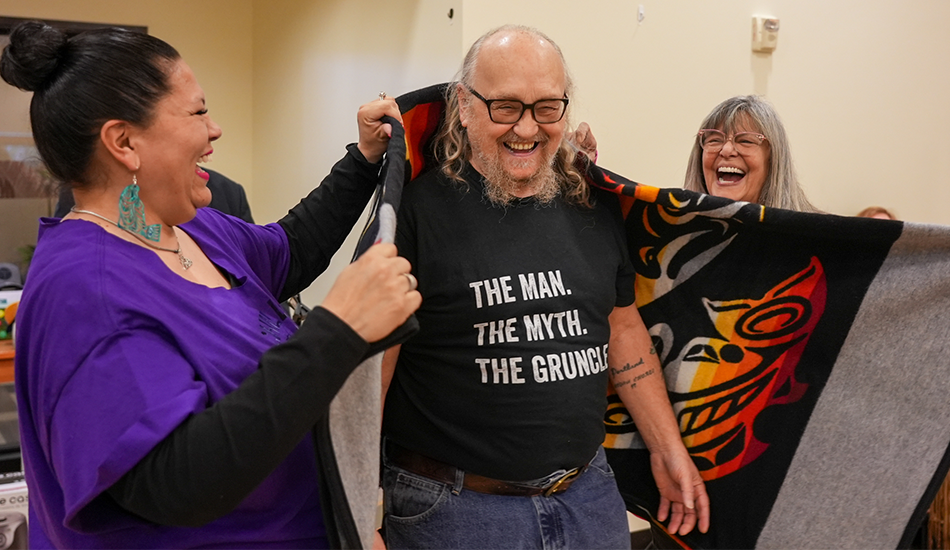By Hailey Palmer, Puyallup Tribal News
A senior Puyallup Tribal member is recognized as the Honored Elder each month at the Elders Luncheon.
Teddy Simchen became the latest Puyallup Tribal Elder to be honored on March 22 as he was blanketed by Puyallup Tribal Council members Anna Bean and Monica Miller. Simchen also received a cedar hat and will have his photo placed on the wall at the House of Respect along with other Honored Elders from the past.
Each Honored Elder also records a video in which they talk about their lives and experiences. Here is Simchen’s story in his own words.
“My name is Teddy Warren Simchen. My first name and middle name are both named after presidents: Teddy Roosevelt and Warren Harding.
“I was born and raised out in Fife, Washington, on a nice, snowing Nov. 19, 1951.
“My mom and dad were married after the war, and I am the middle of five kids. My oldest brothers, Ron and Jay, have both been honored. My younger brother, David, is deceased. My little sister, Laura, has not been honored yet. She’s still in her 60s.
“I remember the days when you couldn’t buy beer on Sundays (and when) Indians were not allowed in bars.
“My grandmother, mom, aunt and great uncle all lived on a family allotment out by the Firwood Tavern that had a hand water pump and an outhouse.
“They moved to Tacoma so my aunt and mother could go to high school and junior high. Back in the ‘30s is probably when they moved into town.
“My Tribal history starts way back to the signing of the Medicine Creek Treaty. I don’t know how many greats, but I had a great-great-great-grandfather that signed the Medicine Creek Treaty and a great-great-great-uncle that signed the Medicine Creek Treaty.
“My great-great-great-grand uncle was one of the first Puyallup Tribal members taken down to the Oregon boarding school. They didn’t even have the barracks built. They had to build their own barracks to stay in. He was the Indian superintendent of the school until he passed away in 1907.
“My great grandmother and great uncle both went there. They both ended up going to the University of Oregon and both have college degrees. Unfortunately, back in those days, an Indian with a college degree didn’t mean anything. My grandmother worked housekeeping at the Cushman Hospital, my great uncle worked in the steam plant laundry and that’s what they did with college degrees and the only jobs they could get.
“I was in the U.S. Army from 1969 to 1972. I’m a Vietnam era veteran, and I proudly carry our colors in various parades and various powwows when we are asked with the other veterans from the Tribe. Most of time I spent in Germany, the states and I was up in Alaska. I got to see the midnight sun, 24 hours of darkness, 24 hours of day and 20-foot snowbanks.
“My initial (Military Occupational Specialty), I was a combat engineer and then I changed over, took some schooling, and I was a field and track vehicle mechanic. When I got out of the service, I used my GI Bill, and for a while I went to diesel mechanic school in Spokane.
“In the military, I ended up losing my identity, and I ended up becoming an alcoholic (and) drug addict. My family had moved over to Eastern Washington by then, and I stayed in Eastern Washington from the time I had gotten out of the service in ‘72. I started coming back around (to Tacoma) in the ‘70s, but I didn’t move back over until it was the 1980s.I got to go to our own Puyallup Tribal treatment center not once, but twice.
“I worked under (Puyallup Tribal Council Vice Chairwoman) Sylvia Miller in the JPTA (Job Training Partnership Act) program. I helped people prep for getting GEDs and basic day-to-day skills for our Tribal members who didn’t go to school very (long).
“Speaking of school, I only completed the ninth grade. After completing the ninth grade, I ended up taking the GED and passing it, and I do have some college.
“I started working out at the school as security. Actually, before the school had security, I worked for the construction company, and I was a gate guard. From there, I transferred to school security, and then I transitioned to the casino security. From casino security, I went back and worked for the Tribe as a gaming agent, overseeing the protection of the casino assets.
“I come from a strong family that has represented the Tribe on Council starting with my grandmother (Ruth Denny LaFleur), who in the 50s, was actually our Tribal Chairman for a while. My mom (Augusta Denny Simchen) was on Council and my aunt (Jacqueline Denny Stiltner) was on Council for various lengths of time back when we had less than 700 Tribal members and Council did not get paid.
“Even when we didn’t have a lot of Tribal members, we would still have Tribal dinners down in the basement of the Presbyterian church over here in our graveyard. They would be well attended by a lot of the Tribal members. Today, we’ve grown to where we have a house and residence for our Elders. We have an inpatient facility, and we have monthly Elders luncheons that are well attended.
“Don’t rely on just your per cap. Learn a trade, learn a job and go to work.”





